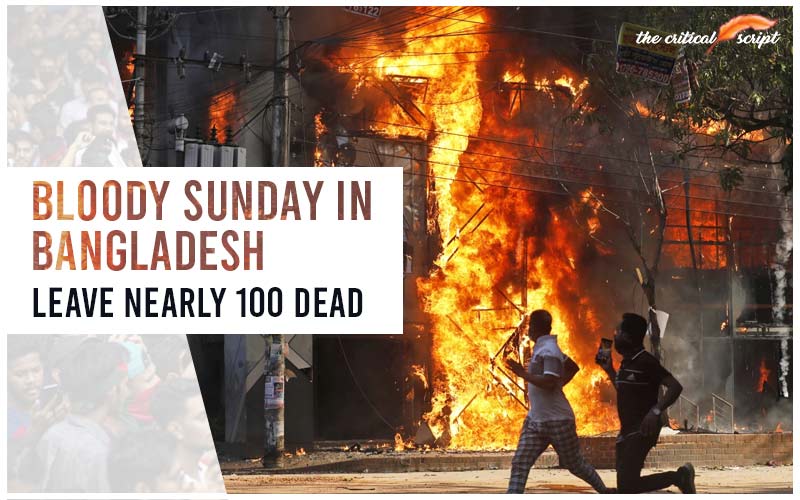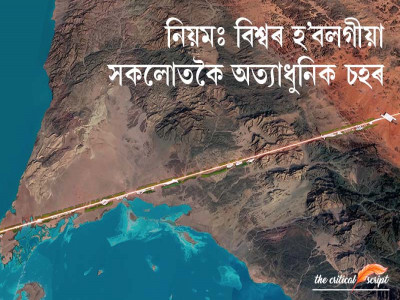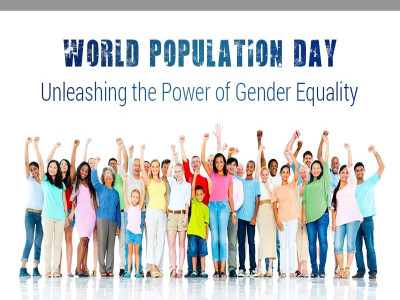
Bloody Sunday in Bangladesh Leave Nearly 100 Dead
Dhaka: On Sunday, nearly 100 individuals, including 14 policemen, lost their lives, and hundreds were injured during violent clashes in various parts of Bangladesh. The confrontations involved protesters demanding Prime Minister Sheikh Hasina's resignation and supporters of the ruling party. As a result, authorities enforced a nationwide curfew and cut off mobile internet access indefinitely.
The unrest began on Sunday morning when demonstrators, organized under the banner of Students Against Discrimination, faced opposition from supporters of the Awami League, Chhatra League, and Jubo League. ProthomAlo, a leading Bengali-language daily, reported that at least 97 people were killed in the violence, with 14 policemen among the dead. Additionally, over 300 policemen sustained injuries.
The clashes erupted days after a previous wave of violence resulted in over 200 deaths, primarily involving student protesters demanding the abolition of a controversial job quota system. The quota reserves 30% of government jobs for relatives of veterans from Bangladesh's 1971 War of Independence.
The current protests saw participation from various groups, including right-wing IslamiShashontantraAndolon activists, who erected barricades on major highways and within Dhaka. Protesters attacked police stations, ruling party offices, and the residences of leaders, and set vehicles ablaze. In response, the government imposed a curfew in major cities and towns, mobilized troops, and ordered the shutdown of Facebook, Messenger, WhatsApp, Instagram, and 4G mobile internet.
Prime Minister Hasina labeled the protesters as terrorists and urged citizens to suppress them firmly. A high-level security meeting was convened to address the escalating violence, attended by top military and security officials.
In an effort to ensure public safety, the government announced a three-day general holiday. Violence was reported in multiple locations, including Dhaka, Feni, Sirajganj, Kishoreganj, Bogura, Munshiganj, Magura, Bhola, Rangpur, Pabna, Sylhet, Cumilla, Sherpur, Joypurhat, Keraniganj, Savar, and Barisal.
In Dhaka, protesters carried the bodies of four victims from Dhaka Medical College Hospital to the Central Shaheed Minar, chanting anti-government slogans. Former senior military generals called for the withdrawal of armed forces from the streets, urging political solutions to the crisis.
Shops and malls in Dhaka remained closed as protesters blocked traffic at key intersections. Incidents of vandalism and arson, including attacks on police vehicles and government buildings, were widespread. Education Minister Mohibul Hasan Chowdhury Nowfel's residence and the office of AL MP MdMohiuddinBachchu were among the targets.
The student-led movement, supported by the Bangladesh Nationalist Party (BNP) and other groups, rejected Prime Minister Hasina's offer for talks. Government leaders accused the peaceful campaign of being hijacked by fundamentalist Jamaat-e-Islami and its student front, IslamiChhatraShibir, with backing from former Prime Minister Khaleda Zia's BNP.
Is
Pakistan ISI Behind Bangladesh Unrest?
Reports suggest that ChattraShibir, the student wing of the banned Jamaat-e-Islami, allegedly backed by Pakistan's ISI, is inciting violence and transforming student protests into a political movement in Bangladesh. Sources indicate that Pakistan’s army and ISI aim to destabilize Prime Minister Sheikh Hasina’s government and restore the opposition BNP to power through protests and street violence. The Hasina administration is closely monitoring the activities of opposition leaders.
While the ISI’s efforts to undermine the Hasina government are not new, the situation has escalated from a student protest over job quotas into a broader political movement, with opposition party members reportedly infiltrating the protest groups. Additionally, the local government is investigating the involvement of Western-backed NGOs in the current crisis, sources noted.
Meanwhile, the University Teachers’ Network has proposed the formation of an interim government consisting of representatives from various sections and professions. According to the proposal, Hasina will need to hand over power to the interim government. The teachers’ network held a press conference titled ‘Proposal of an Outline for Transition to a Democratic Bangladesh Free of Discrimination’ at the Sagar-Runi Auditorium of Dhaka Reporters’ Unity Sunday.
Disclaimer: The opinions expressed in this article are those of the author's. They do not purport to reflect the opinions or views of The Critical Script or its editor.

Newsletter!!!
Subscribe to our weekly Newsletter and stay tuned.
















Related Comments